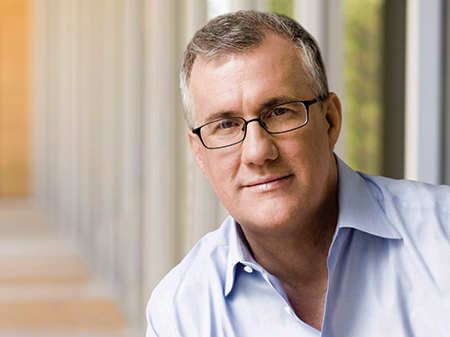5 Questions
By Steve Chagollan

Participant Media's CEO David Linde has long been a fixture in the specialty films arena, with top-level stints at Good Machine and Focus Features before eventually becoming chairman of Universal Pictures. In 2015 he joined Participant, whose founder and chairman, Jeff Skoll, made it his mission to create "entertainment that inspires and compels social change." With Linde, Skoll recruited an executive synonymous with prestige projects and relationships with A-list filmmakers like Alfonso Cuarón, with whom Linde has worked on seven films to date. Linde spoke to DGA Quarterly on the Friday before this year's Oscars, where Participant reveled in Green Book's win for best picture, and took pride in the ceremony's other big winner, Roma. Both were financed by Participant, adding to the company's tally of 73 Oscar nominations and 18 wins since its inception in 2004.
1. Tell me how Participant Media is different from what you've experienced before in the movie business?
We all mature in our careers, and three years into this job, this feels like a natural progression in my career.
I was brought up by parents who were very focused on culture being an important attribute. You couldn't really understand the world unless you understood that people are not the same, but they share common goals and interests.
I really believe that Jeff's vision for the company—that a story well told contributes to real positive change in the world—is prescient. And one of the reasons we're having such a good run right now is timing. I like to say that artists can see around the corner on an issue, on what is going to become important to us as audiences. And that's what Participant is all about.
2. How do you develop relationships with directors?
I'm obviously comfortable in developing relationships with directors and trusting their artistic perspective in creating a film, and mutual trust has resulted in working on multiple films with many great filmmakers. It's wonderful that Participant's heads of content, Jonathan King and Diane Weyermann, share a similar point of view. We've already worked with Alfonso Cuarón and Todd Haynes, both of whom I have collaborated with in the past, and we are working on our second film with Steve James, so the strategy really exists on the documentary side as well.
3. Are there situations where your films have resulted in either legislative action in D.C. or more regionally?
Yes, lots. An Inconvenient Truth brought to the surface a crisis that people weren't really talking about and was absolutely a cultural shift in the conversation around climate change. In the case of Food, Inc., you saw real behavioral change around a moment in time when people began to think quite concretely about what they are putting into their bodies.
What differentiates us from every other company in the concept business is we have what we call a social impact department, and it's run by Holly Gordon, who is the chief impact officer. [She] ran one of the most successful content-to-impact campaigns of the past 10 years, which is an existing campaign around a film called Girl Rising. We pursue what we call a partnership model with artists, with best-in-class distributors, because if nobody sees your movies, then you're not going to have any social impact. So, we have had global infrastructure distribution around all our movies. But the key thing is that our social impact group partners with nonprofits and NGOs and other impact organizations that are doing the boots-on-the-ground advocacy work.
Around RBG and On the Basis of Sex, we're working with the ACLU on a campaign around gender equity, and especially equal pay.
4. Social consciousness versus commerce: Are they mutually exclusive or can you achieve both together successfully?
They are totally collaborative. We're collaborating with our distributors, who are putting audiences into the seats. What we're doing through our campaigns is creating a fourth act for the movie and giving audiences the opportunity after they've experienced the movie to actually engage in something they feel is important. It's our job to identify those people who are going to have a different kind of interest in the movie, which is actually sustained through seeing it all the way into engaging with our impact partners around the issue.
5. Streamers like Netflix don't reveal viewing numbers or even theatrical attendance—what are your thoughts?
Distributors are increasingly developing a very distinct persona, and Amazon is different from Netflix, which is different from Focus Features, [which] is different from Warner Bros., which is different from YouTube—all companies we're in business with. So, I've always said it's the producer's responsibility to not just make a movie, it's the responsibility of the producer to live the life, to participate in the entire life of the movie. So, we have a great relationship with Netflix, and they collaborate very closely with us on the marketing of the movie and we talk to them all the time about who's seeing the movie and what the reach is and where.